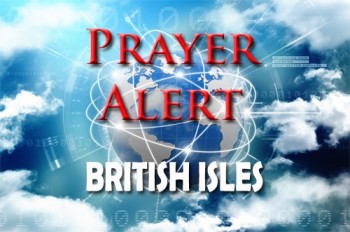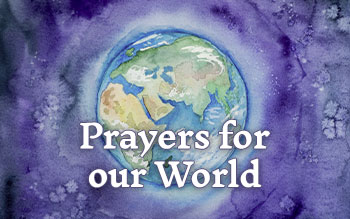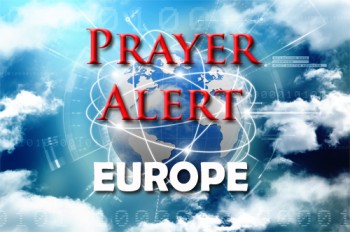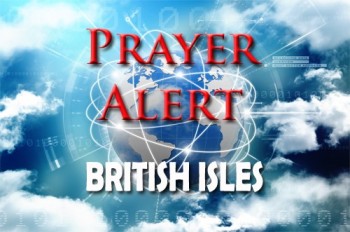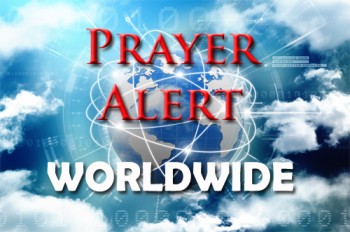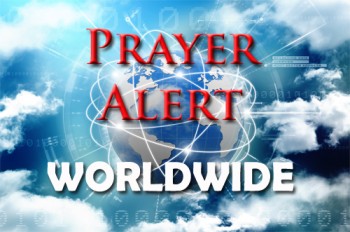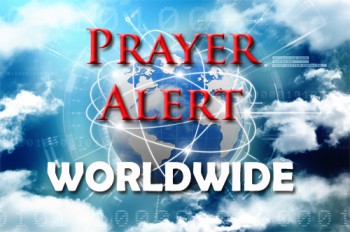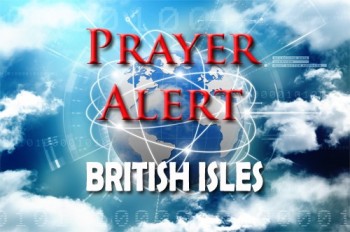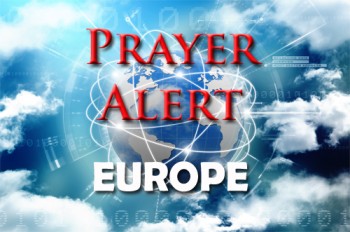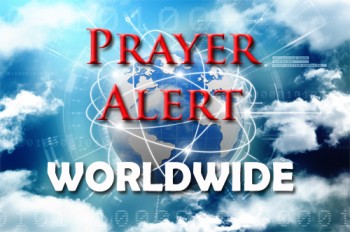Displaying items by tag: Climate change
Living Lent: caring for creation
In 2019 ‘Living Lent’ was produced by the Methodist Church, the Church of Scotland, the Baptist Union and the United Reformed Church. It continues in 2020, inviting Christians to make radical changes for the climate during Lent. Our lifestyles and choices mean we have played a role in damaging creation. Churches are responding to the climate crisis with Lent activities which include a lifestyle change - inviting people to make a positive commitment towards change, developing habits that last long after the forty days. Participants, starting on Ash Wednesday, will use daily reflections to explore how our faith and concern for creation connect, through the Bible, through art and through poetry. Individuals will support each other as a dispersed community, for example on Facebook and Twitter through the hashtag #livinglent2020. Also,, the Church of England 2020 ‘Live Lent’ course focuses on care for creation and on protecting the earth from climate change. See
Good News - 2019 was the Best Year Ever
Let’s be encouraged and thankful as we reflect on some positive statistics and information that Nicholas Kristoff has compiled in the New York Times.
For humanity over all, life just keeps getting better.
If you’re depressed by the state of the world, let me toss out an idea: In the long arc of human history, 2019 has been the best year ever.
The bad things that you fret about are true. But it’s also true that 2019 was probably the year in which children were least likely to die, adults were least likely to be illiterate and people were least likely to suffer excruciating and disfiguring diseases.
Every single day in recent years, another 325,000 people got their first access to electricity. Each day, more than 200,000 got piped water for the first time. And some 650,000 went online for the first time, every single day.
Perhaps the greatest calamity for anyone is to lose a child. That used to be common: Historically, almost half of all humans died in childhood. As recently as 1950, 27 percent of all children still died by age 15. Now that figure has dropped to about 4 percent.
“If you were given the opportunity to choose the time you were born in, it’d be pretty risky to choose a time in any of the thousands of generations in the past,” noted Max Roser, an Oxford University economist who runs the Our World in Data website. “Almost everyone lived in poverty, hunger was widespread and famines common.”
But … but … but President Trump! But climate change! War in Yemen! Starvation in Venezuela! Risk of nuclear war with North Korea. …
All those are important concerns, and that’s why I write about them regularly. Yet I fear that the news media and the humanitarian world focus so relentlessly on the bad news that we leave the public believing that every trend is going in the wrong direction. A majority of Americans say in polls that the share of the world population living in poverty is increasing — yet one of the trends of the last 50 years has been a huge reduction in global poverty.
As recently as 1981, 42 percent of the planet’s population endured “extreme poverty,” defined by the United Nations as living on less than about $2 a day. That portion has plunged to less than 10 percent of the world’s population now.
Every day for a decade, newspapers could have carried the headline “Another 170,000 Moved Out of Extreme Poverty Yesterday.” Or if one uses a higher threshold, the headline could have been: “The Number of People Living on More Than $10 a Day Increased by 245,000 Yesterday.”
Many of those moving up are still very poor, of course. But because they are less poor, they are less likely to remain illiterate or to starve: People often think that famine is routine, but the last famine recognized by the World Food Program struck just part of one state in South Sudan and lasted for only a few months in 2017.
Diseases like polio, leprosy, river blindness and elephantiasis are on the decline, and global efforts have turned the tide on AIDS. A half century ago, a majority of the world’s people had always been illiterate; now we are approaching 90 percent adult literacy. There have been particularly large gains in girls’ education — and few forces change the world so much as education and the empowerment of women.
You may feel uncomfortable reading this. It can seem tasteless, misleading or counterproductive to hail progress when there is still so much wrong with the world. I get that. In addition, the numbers are subject to debate and the 2019 figures are based on extrapolation. But I worry that deep pessimism about the state of the world is paralyzing rather than empowering; excessive pessimism can leave people feeling not just hopeless but also helpless.
Readers constantly tell me, for example, that if we save children’s lives, the result will be a population crisis that will cause new famines. They don’t realize that when parents are confident that their children will survive, and have access to birth control, they have fewer children. Bangladesh was once derided by Henry Kissinger as a “basket case,” yet now its economy grows much faster than America’s and Bangladeshi women average just 2.1 births (down from 6.9 in 1973).
Yes, it’s still appalling that a child dies somewhere in the world every six seconds — but consider that just a couple of decades ago, a child died every three seconds. Recognizing that progress is possible can be a spur to do more, and that’s why I write this annual reminder of gains against the common enemies of humanity.
So I promise to tear my hair out every other day, but let’s interrupt our gloom for a nanosecond to note what historians may eventually see as the most important trend in the world in the early 21st century: our progress toward elimination of hideous diseases, illiteracy and the most extreme poverty.
When I was born in 1959, a majority of the world’s population had always been illiterate and lived in extreme poverty. By the time I die, illiteracy and extreme poverty may be almost eliminated — and it’s difficult to imagine a greater triumph for humanity on our watch.
By Nicholas Kristof, Opinion Columnist, NY Times
More at: https://www.nytimes.com/2019/12/28/opinion/sunday/2019-best-year-poverty.html
Pray: giving thanks for the positive steps that are being made across the quoted areas including life expectancy, poverty, literacy, education, health and access to utilities.
Pray: that these advancements will not falter and that governments will continue to invest in improvements in the quality of life of their people.
Switzerland: Davos - climate change
The World Economic Forum annual meeting of 3,000 of the world's richest and most powerful people took place this week in Davos. One of the speakers was Greta Thunberg, who opened a debate entitled, ‘How to avert a climate apocalypse’. Attendees were not able to avoid climate change, as the theme was ‘Stakeholders for a Cohesive and Sustainable World.’ Meanwhile let us pray for Canadian residents cleaning-up after a monstrous winter storm that brought thirty inches of snow, causing chaos; for Australians dealing with the aftermath of severe thunderstorms, floods and hail the size of golf balls in different areas, while fire weather warnings cover parts of Western Australia; and for tens of thousands living near the restless Philippines volcano ‘recharging’ with fresh magma and toxic gas. The forum is asking all companies in Davos to commit to net zero carbon emissions by 2050.
Sir David warns of 'crisis moment'
‘The moment of crisis has come in efforts to tackle climate change.’ ‘We have been putting things off for year after year.’ ‘Southeast Australia is on fire because the temperatures of the Earth are increasing,’ warned Sir David Attenborough. The crisis has come because, although scientists are urging rapid responses. international decisions made on key issues at climate conferences are put off and several countries are trying to dodge their commitments. Sir David said, ‘This is not just having a nice little debate and then coming away with a compromise. This is an urgent problem that has to be solved and we know how to do it - that is the paradoxical thing. We are refusing to take steps that we know must be taken. The release of greenhouse gases is increasing, not falling. The level of carbon dioxide in the atmosphere is now higher than anything experienced in history.’
Australia: thousands in climate change rally
20,000 angry climate change protesters turned out in Sydney on 11 December, attacking Australia's leaders in their speeches and chants as bushfires suffocated the city with ‘lethal’ thick smoke. A firefighters’ union representative said that the fires are ‘the worst fires we have had in decades. Our members are saving lives, property, wildlife, stock and pets, but they are spread thinly as they are also responding to their regular work. The NSW Government has failed. We have got no water because the state and the country are in drought. We need a government that takes action.’ Australia is on high-alert as temperatures soar above 40C and smoke haze blankets the cities setting off fire alarms.
Global: small island states and COP25
The Alliance of Small Island States (AOSIS) is an intergovernmental organisation of low-lying coastal and small island countries, many of which are put at risk by climate change. As COP 25 enters its second week, AOSIS warns, ‘We are mired in a planetary emergency of existential proportion. We have breached 60% of the 15 planetary tipping-points. The impacts are real and current for people living on small islands. The entire atoll of Tuvalu is at risk of flooding from sea-level rise by 2050. Even greater segments of other small island states are at risk much earlier than previously projected. Our schools, ports, hospitals, centuries-old monuments, sacred sites, and other critical infrastructure are at risk of inundation and destruction.’
Just Transition: a framework for change
After centuries of global plunder, the industrial economy is severely undermining the life support systems of the planet. Just Transition believes we must build visionary economies different from the ones we are now in. This requires stopping the bad while at the same time building the new: changing the rules to redistribute resources and power to local communities, shifting from incinerators and landfills to zero waste, from dirty energy like coal to energy democracy. Burning coal is a huge driver of climate change. Coal mining employs six million people globally, and is the linchpin of many communities. Nuclear energy, fracking, and ‘clean coal’ are offered as economic solutions, but they harm the health of people and the planet. The path of extracting, transporting, processing, and consuming these technologies is paved with cancer and respiratory disease, among other devastating health impacts. These ‘solutions’ turn low-income communities into sacrifice zones.
Hundreds of churches at risk from harsh weather
Harsh weather linked to climate change will leave hundreds of English churches at risk of destruction or closure this winter, author and activist Bill Bryson has warned. There are 900 churches registered on Historic England's ‘at risk’ list. Mr Bryson, vice-president of the National Churches Trust (NCT), has said it is England's ‘national responsibility’ to protect England's historic places of worship. The NCT received a record 593 applications from churches for maintenance and repair grants last year, but this year the figure leapt by another 37%. Bryson said, ‘Nothing embodies a quintessential Christmas like a historic church in the snow, but winter is when these ancient and often fragile buildings are most at risk of serious damage from severe weather.’
Venice ‘state of emergency’ flooding
Italy declared a state of emergency on 14 November after floods brought carnage to Venice. The prime minister described the flooding as 'a blow to the heart of our country'. The government took on 'exceptional powers' to respond to the damage, estimated at hundreds of millions of pounds, including millions in St Mark's Basilica alone. The mayor said the city was 'on its knees', and warned of 'widespread devastation' after an unprecedented combination of high spring tides and a storm surge of a 6ft 2in tide on the night of 13 November. The mayor has blamed climate change for the disaster, but there was also anger among Venetians at the corruption which has held up a flood barrier project.
Australia: NSW and Queensland bushfires
Crews are currently battling 120+ fires. ‘Leave now' warnings have gone to homes and dozens more are at ‘Watch and Act’ level. Hundreds of homes have been destroyed, and over a million hectares consumed. A water-bombing helicopter crashed in gusty conditions. Pray for the farmers who have lost entire crops and farm infrastructures. Ask God to comfort residents told to evacuate immediately and now fearful of what they will return to. Pray for stamina for the crews fighting fires and those patrolling smouldering zones. Pray for the police to have wisdom and discernment as they contend with looters impersonating firefighters to gain access to empty homes. The deputy prime minister dismissed talk of climate change as the concerns of ‘raving inner-city lefties’, adding, ‘We've had fires in Australia since time began’. See also
